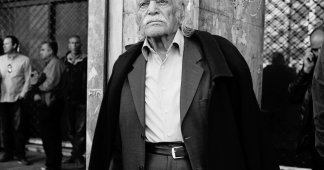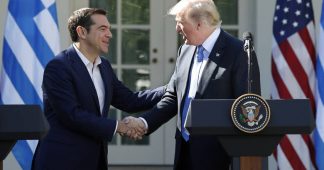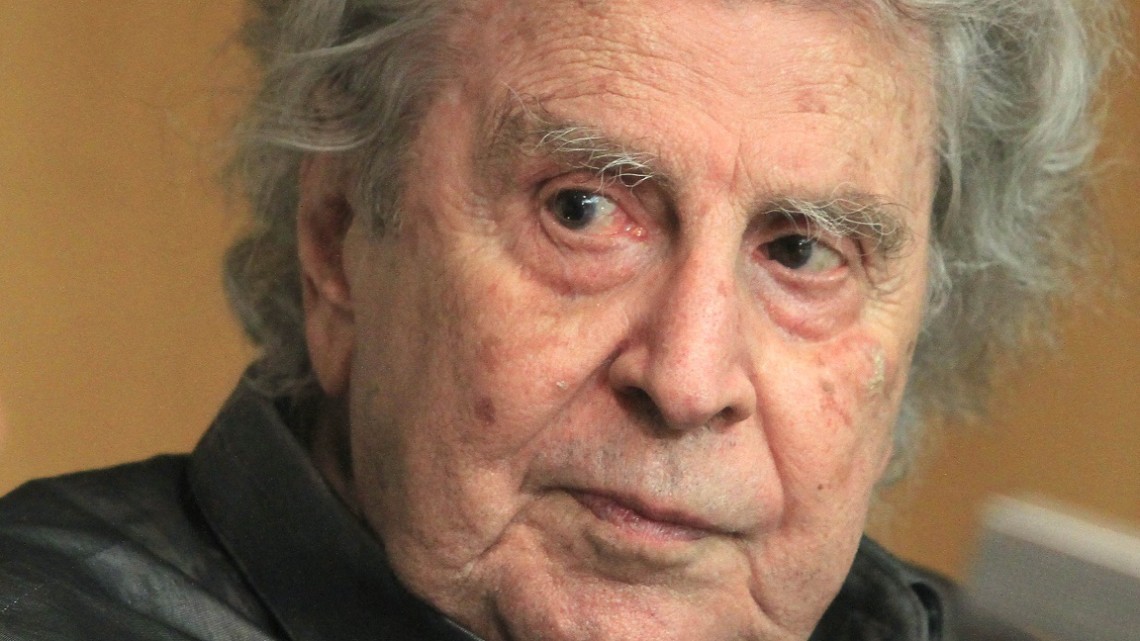Locked in their homes under Coronavirus restrictions, the like of which Greeks were not submitted to even during the German occupation or the military dictatorship, since yesterday the Greek people have been mourning their national hero Manolis Glezos. Manolis became the symbol of the Greek resistance to Nazism and Fascism during WWII, the most massive in Europe in proportion to the size of the country, by lowering, with his friend Lakis Santas, the German flag from the Acropolis. General De Gaulle called Manolis Glezos the first resistant in Europe.
After the German occupation ended, Greece continued to suffer, this time from British and US intervention; terrorism against resistance fighters – most of whom were Left- inclined; and the ensuing Civil War. Glezos was persecuted for his ideas and sentenced to death nine times. Only a huge international mobilisation was able to save his life. He nevertheless spent many years of his life in prison and exile.
A leader of the Greek Left after the end of the Civil War, Glezos was again persecuted during the military dictatorship of 1967 to 1974. He criticised the Soviet invasion of Czechoslovakia in 1968, and gradually became an ardent supporter of the ideas of direct democracy and a critic of Stalinism. In 1977 he cosigned along other intellectuals and militants like Noam Chomsky, Louis Althusser, Michel Raptis (Pablo) etc. a letter to the Soviet leadership asking for the rehabilitation of Nikolai Bukharin. Bukharin was executed by Stalin as a “traitor” and an “agent”, as had happened with all other prominent leaders of the Russian Revolution and the Bolshevicks, like Trotsky, Zinoviev, Kamenev etc.
Until his last moments, Glezos was physically present at all major struggle. In 1993, he co-operated with Michel Raptis (Pablo), a former Secretary of the Fourth International, who launched an international initiative against the “New World Order” of President Bush and the sanctions against Libya, Yugoslavia, Cuba and Iraq.
In 1999, Glezos traveled to Belgrade, then under illegal NATO bombing, in order to express his solidarity with the Serbs.The Greek police almost killed him twice with tear gas during 2010 and 2012 demonstrations.
Glezos, helped a lot the rise of SYRIZA and of Tsipras, given his enormous moral prestige . In 2011 he signed an appeal with Mikis Theodorakis and a number of personalities from across Europe, known also as the “Mikis-Glezos appeal”, for the salvation of the Greek and European peoples. For a long time this appeal has been the main document of the European ‘radical left’ on the European crisis. But unfortunately, the leaders and the parties of the Greek and the European “Radical Left” proved to have more bark worse than bite.
Glezos strongly disagreed with the Tsipras-Varoufakis’ agreement with the Eurogroup shortly after the 2015 elections. In an open letter of 22 February 2015, under the heading ‘Before it is too late’, he called on SYRIZA to fulfill the promises made to the Greek people, on the basis of which he had been elected to power. He apologised repeatedly to the Greek people for asking them to trust Tsipras and SYRIZA.
The last text Manolis Glezos signed was a call to the Archbishop of Canterbury to exert all his influence to free Julian Assange.
In a following article we shall return to the role and importance of Manolis Glezos and his generation in Greek history.
Dimitris Konstantakopoulos
March 31, 2020









